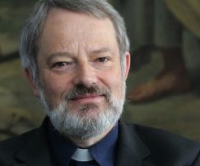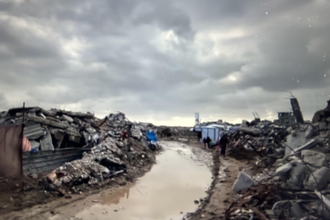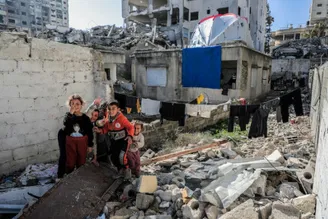Ireland: Dublin priest appointed as Bishop of Elphin

Bishop-elect Kevin Doran
Pope Francis has appointed Fr Kevin Doran bishop of the diocese of Elphin, Ireland. Bishop-elect Doran succeeds Bishop Christopher Jones in the pastoral care of the diocese on the western coast of Ireland.
Bishop-elect Kevin Doran was born in Dublin on 26 June, 1953. He studied for the priesthood at Mater Dei College in Dublin and at the Pontifical Irish College in Rome. He was ordained a priest July 6, 1977 for the Archdiocese of Dublin.
After his ordination, he taught in a school in Ringsend, Dublin (1977-1983). From 1980 to 1983 he served in the diocesan Secretariat for Education. In 1983 he was appointed University Chaplain. In 1990 he returned to Rome, earning a doctorate in philosophy at the Angelicum and at the same time was appointed Spiritual Director at the Irish College .
On returning to Ireland he was Parochial Vicar at Foxrock (1995-1998), director of the diocesan, later national Commission for Vocations (1998-2006), pastor of Glendalough (2005-2009) , and finally, Secretary General of the Preparatory Committee of 50th International Eucharistic Congress (2008-2012) .
To date he has also served as Director for the Formation of Permanent Deacons (since 2007) , Secretary of the Commission of the Bishops' Conference on Bioethics (1996) , Member of the Management Committee Mater Misericordiae Hospital in Dublin and Consultant to the Congregation for Catholic Education .
Since 2013, he had been serving in Sacred Heart Parish, Donnybrook in Dublin .
In his words of greeting this morning, Bishop-elect Kevin Doran said:
Your Excellency Archbishop Charles Brown, people, priests and religious of the Diocese of Elphin, agus a chaired go léir
I must confess to being a little surprised to find myself here this morning. Two weeks ago, we finalised a development plan for the parish, and that was the only plan I had in mind for the foreseeable future. I have learnt over the years, however, that vocation is never static. God is always calling us and, while we can only see a short way ahead, He has a plan for each one of us, which extends beyond time into eternity. And so Abraham “left his country to go to the place that God would show him”; the disciples of Jesus went off to “make disciples of all nations” and generations of Irish missionaries, including many from this diocese, followed in their footsteps. I am particularly happy to find myself here in this diocese, because – while I am a third generation Dubliner, I have had (as Bishop Jones mentioned) many links with the historic Diocese of Elphin over the years. The first of these was my ordination as a deacon by Bishop Dominic Conway in 1976.
Each day brings with it the challenge of discerning what God is asking. In that sense, we are never done learning what it is to be a Christian or to be a disciple. Since the day I was ordained I have been learning what it means to be a priest. I think my colleagues will know what I mean when I say that we are ordained to serve God’s people, but it is often God’s people who teach us how to be good priests. Now, I have to learn to be a bishop and I hope you will be my teachers.
For all sorts of reasons, a diocese these days has administrative structures which can make it look like a cross between a business and a government department. The Church certainly needs to be organised and business-like but we must never lose sight of the fact that, first and foremost, it is a community of faith.
Since the time of Saint Asicus in the fifth century, we have seen the establishment of the monasteries and the diocesan structures and we have seen periods when there were no resident bishops, but throughout all of those years, our ancestors became members of the Body of Christ through Baptism and were drawn into communion with Him through the Eucharist. Communion is not simply something that we receive; it is what we are called to become. “Though we are many, we are one body in Christ”. (1 Cor. 10)
It is the role of the bishop to be the servant of Communion and he carries out his ministry under three particular headings, as a teacher of faith, as one who leads the people in the celebration of the liturgy, and through the administration of the diocese (cf. LG 20). He is also called to be the visible sign (or sacrament) of communion with the universal Church and the other local churches both at home andabroad.
Thankfully, I have had some very useful experience in teaching, in pastoring and in administration, but there will be people here in this diocese, including members of the lay faithful, who will have more experience in one or other of these areas than I have. The bishop is not called to be a “lone ranger”. The service of communion includes recognising the diverse gifts which the Spirit has given to everyone in the community of the diocese, religious, clergy and members of the lay faithful, and making it possible for those gifts to be developed and placed at the service of all.
I am very happy to see so many of the priests of the diocese here this morning. I know from speaking with Bishop Jones and, in some cases from my own experience, how generous you are in your service and I look forward very much to working closely with you. Through the sacrament of Holy Orders a priest, in spite of his own human limitations, and even his personal sinfulness, becomes Christ for the people. His priesthood is not just a matter of what he does, it goes deeper than that, to the very reality of what he is. The diocese will always need good priests and if we seem to be short of younger priests right now, it is certainly not because God has stopped calling. It may be that, as church, we are not listening carefully enough.
The permanent diaconate, while it is as old as the Church, is a relatively new experience for us here in Ireland. I am delighted to come to a diocese where the permanent diaconate is already established and I look forward to the growth of this ministry as part of the service of communion. The diaconate, with its focus on the ministry of charity, reminds us that, as Christians, we are not called to be simply consumers of religion. We are called to be “washers of feet”. Each one of us is sent out to serve, in imitation of Jesus who washed the feet of his disciples.
Much of the energy of Jesus went into gathering people and forming community. Much of our energy today seems to go into organising people. It sometimes seems that, while there is an enormous amount of contact, there isn’t that much real
communication. Many people, both in the city and in the countryside remain lonely and isolated; the elderly; the homeless and even young people. We cannot, as St. Paul wrote, celebrate the “Lord’s Supper” and then ignore the everyday challenge of being the body of Christ (1 Cor.11:17). “The joys and the hopes, the grief and the anguish” of the people of our time are part of the concern of the Church. (cf. GS 1)
Many of the services which, traditionally, were provided by the Church as an expression of communion and solidarity, are now state funded, and to a greater or lesser extent, state controlled. It is important for us to reflect on the nature and the meaning of these partnerships between Church and State. The Church, as Pope Francis reminds us “does not have solutions for every particular issue. Together with the various sectors of society, she supports those programmes which best respond to the dignity of each person and the common good.” (EG 241). As Christians, we must be actively involved in the public space, not primarily to control all sorts of projects, but to place our gospel vision at the service of society.
Our primary reason for being involved in education, healthcare and social services, is to bear witness to the Gospel. In keeping with that Gospel, there are a number of principles that should be at the heart of everything we do. These include a love of preference for the poor, the safeguarding of children, support for marriage and the family and an unambiguous respect for human life from its origins to its natural end. We need never apologise for these.
Speaking of children, I want to say something to the girls and boys from the local parishes who will soon be celebrating their Confirmation. I am really delighted to see you here this morning. I’m sure that, by now, you know all about Chrism. It is olive oil, blessed by the Bishop, and it is a sign that we have been given a special mission. In a few weeks’ time, Bishop Jones will anoint my head with oil as a sign that God has given me a new mission as the Bishop of Elphin. But before that, he will anoint you with Chrism, on the day of your Confirmation. Always remember that, as you grow through your teenage years and become adults, you have a mission from God and there is nothing more exciting that you can do in your life than to work out what your mission is and to follow where Jesus leads you. I will pray for you especially during these weeks and I hope you will pray for me.
I don’t normally go on so long, but then I rarely have such a good excuse. Before I finish, I want to take this opportunity to thank Archbishop Brown, the Papal Nuncio, for his kindness and his advice during these past few weeks. I am very grateful to Bishop Jones for his warm welcome and I know that I will be calling on his wisdom and experience in the months ahead.
There is, of course, a certain sadness in leaving my own home diocese and the parish where I have been very happy. I am very grateful to Archbishop Diarmuid Martin and indeed to Cardinal Desmond Connell and their predecessors, for the trust they have placed in me over the years and for the opportunities they have given me to grow in priesthood.
I’ll end if I may, with a story. A few weeks after I was ordained, I came to Sligo to spend a few days with friends who were students with me in Rome. One morning I celebrated Mass at Saint John’s Hospital and, when I came to the washing of the hands at the Offertory, I heard a man’s voice from the back of the chapel saying quite audibly “please God wash away the priests’ sins”. That man, for all his simplicity, had the mind of the Church. He is long gone now, but the priest is still here and still in need of that same prayer. Thank you and God bless you all.
Father Doran was in the headlines last October when he resigned from the management committee of the Mater Hospital over their decision to comply with new government ruling on abortion. See: www.irishcatholic.ie/article/priest-resigns-mater-hospital-over-abortion-stance















